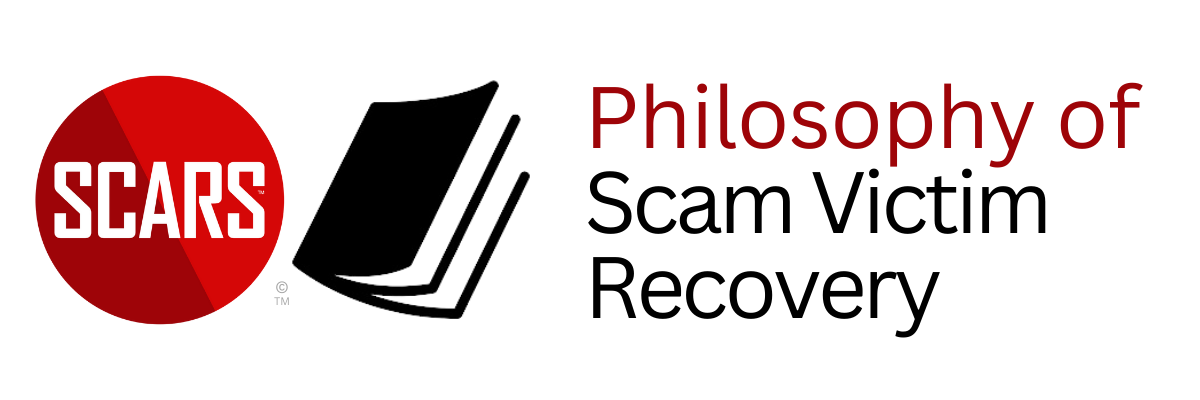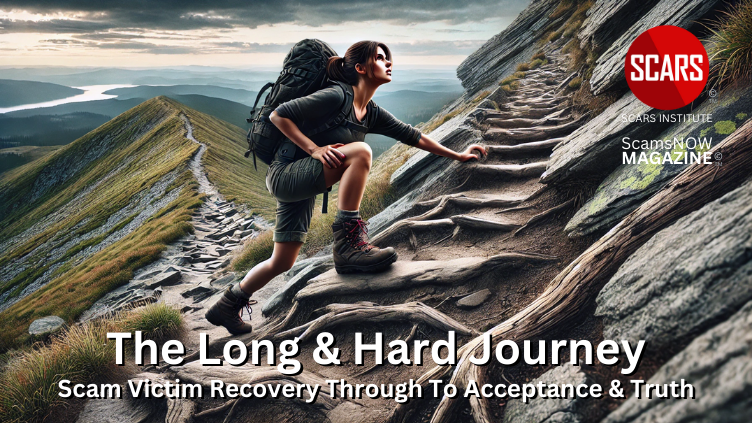Courting the Wild Twin – a Novel Perspective on the Duality of Scam Victim Recovery
A Mythic & Philosophical Journey Through Scam Victim Recovery
Primary Category: Recovery Philosophy
Intended Audience: Scam Victims-Survivors / Family & Friends
Author:
• Tim McGuinness, Ph.D., DFin, MCPO, MAnth – Anthropologist, Scientist, Polymath, Director of the Society of Citizens Against Relationship Scams Inc.
About This Article
Scam recovery is not just about regaining financial stability but about reclaiming one’s sense of self and intuition—the wild twin that was silenced by deception. Drawing from Martin Shaw’s Courting the Wild Twin, this journey mirrors ancient myths of exile and return, where victims must navigate grief, self-doubt, and lost trust before emerging wiser and stronger.
The process involves facing loss without self-blame, rebuilding intuition, learning the mechanics of deception, and ultimately returning with hard-earned wisdom. Rather than remaining trapped in shame, scam victims can transform their experience into empowerment, becoming guides for others and ensuring they never fall prey again. Recovery is not about returning to who they were before—it is about becoming someone even stronger, more discerning, and deeply connected to their own inner knowing.

Courting the Wild Twin: A Mythic & Philosophical Journey Through Scam Victim Recovery
Introduction: The Theft of Self
When someone falls victim to a scam, the loss is not just financial. The deeper wounds are often psychological and emotional—shattering trust, eroding self-confidence, and severing a person from the reality they once believed in. It is an exile, a forced departure from a former self, and for many, a long, uncertain road back to wholeness.
Martin Shaw’s ‘Courting the Wild Twin’ offers a unique lens through which scam victims can view their journey of loss and recovery. Shaw speaks of the wild twin, the forgotten, untamed part of ourselves that has been dismissed, silenced, or lost. This twin represents instinct, intuition, and deep knowing—the very qualities that could have warned us, had we only been able to hear them. But deception preys upon our distractions, our hopes, and our vulnerabilities, and by the time the truth emerges, it often feels too late.
Yet Shaw’s philosophy also offers a way forward. It suggests that healing is not about returning to who we were before the scam but about undergoing an initiation—one that reconnects us to a deeper, wiser, and more resilient version of ourselves. Scam recovery, in this light, is not just a process of grieving and rebuilding; it is an opportunity to rewild—to rediscover the instincts and inner wisdom that were always there, waiting to be reclaimed.
The Betrayal: Losing the Wild Twin
When someone realizes they have been deceived, the initial response is often disbelief. How could this happen? How did I not see it? The mind races backward, searching for clues that were missed, and warnings that went unheeded. It is a moment of profound rupture, where everything that felt stable is suddenly shaken.
In this moment, it feels as if something essential has been stolen—not just money, but trust in one’s own judgment. This is the loss of the wild twin, the intuitive self that might have sensed something was wrong. But trauma clouds perception, making it difficult to recognize this loss as anything more than failure. Victims often turn inward, blaming themselves for their supposed naivety or poor decision-making, rather than recognizing the complexity of the manipulation they endured.
Yet, Shaw’s philosophy tells us that the wild twin was never truly gone—it was only silenced, buried beneath the noise of persuasive lies, urgent pleas, and manufactured trust. The real journey of recovery begins when scam victims stop seeing themselves as powerless and start seeking out the part of themselves that can still navigate, still discern, and still rise.
The Wilderness of Recovery
The road back from deception is not a simple return to normalcy; it is a journey through the wilderness. Like the heroes in ancient myths who are exiled and must find their way home, scam victims must go through phases of grief, confusion, and deep questioning before they can reclaim themselves.
1. Facing the Loss Without Self-Blame
In many myths, a character is sent into the wilderness after a betrayal or great loss. They wander, uncertain and alone, struggling to make sense of what has happened. This mirrors the psychological state of a scam victim. There is often shame, anger, and regret. Society, too, may reinforce these feelings, asking, “How could you fall for that?”—as if deception is a failing rather than an expertly crafted crime.
But to heal, one must first recognize that being deceived is not a reflection of personal weakness. Scammers manipulate emotions, social expectations, and even cognitive blind spots. Recognizing this does not erase the pain, but it begins to shift the narrative—from one of failure to one of survival.
2. Rebuilding Intuition and Inner Trust
The wild twin represents the part of ourselves that knows—the part that once detected small inconsistencies but was overridden by hope, urgency, or manipulation. To recover, scam victims must reestablish their connection to that inner voice.
One way to do this is through reflection: What did I sense, even if I ignored it? Were there moments of hesitation? Instead of dwelling on why these instincts were ignored, the focus should be on recognizing that they were there at all. That is the first sign that the wild twin still exists.
From here, trust can be rebuilt through small steps: learning to pause before making decisions, setting stronger boundaries, and testing new relationships with caution and awareness. Scam recovery is not just about protecting oneself from future deception, but about learning to trust one’s own perception again.
3. Learning the Language of Deception
Just as the hero in a myth must learn new skills to survive their journey, scam victims benefit from educating themselves about fraud, psychological manipulation, and the broader systems that enable deception.
Understanding how scams operate does more than prevent future harm—it empowers victims by giving them a map of the landscape. It is no longer just a personal story of betrayal; it becomes part of a larger battle against exploitation. Recognizing the techniques scammers use—grooming, love-bombing, urgency tactics, and social engineering—shifts the narrative. The victim is no longer a passive participant in their own misfortune but an informed individual capable of identifying and resisting deception in the future.
Returning with Wisdom
In myths, the hero does not return home unchanged. They bring back something—knowledge, strength, a new understanding of the world. Scam victims, too, do not emerge from their experience as the same people they were before. But that is not necessarily a loss.
The journey through deception and recovery is painful, but it can be transformative. Those who have faced scams and survived are not just people who were taken advantage of—they are people who now see the world with sharper eyes. They understand manipulation. They recognize red flags. They have the ability to warn others.
This wisdom, when shared, has the power to protect. Scam victims who speak out, who educate their communities, who support others going through similar experiences—these are the ones who truly reclaim their wild twin. Instead of living in fear, they become guides.
Compassion, Not Indulgence
A key part of this journey is compassion—not just for others, but for oneself. Victims of scams often feel a deep sense of shame, believing they should have known better. But to court the wild twin is to let go of shame and replace it with understanding.
Compassion, however, does not mean indulgence. It does not mean ignoring the warning signs in the future or allowing fear to dictate one’s decisions. It means acknowledging what happened, integrating the lessons learned, and moving forward with strength rather than bitterness.
Conclusion: A New Story to Tell
The final act of a myth is not just the return—it is the telling of the story. Scam victims who reclaim their narrative, who refuse to be silenced by shame, are the ones who truly complete the journey. They are no longer trapped in their loss; they have transformed it into something meaningful.
So to those who have suffered deception: The wild twin is still within you. It was never lost—only waiting for you to remember. You are not broken. You are not foolish. You are in the process of reclaiming yourself. And when you do, you will walk with wisdom that no scammer can ever take from you again.
-/ 30 /-
What do you think about this?
Please share your thoughts in a comment below!
Statement About Victim Blaming
SCARS Institute articles examine different aspects of the scam victim experience, as well as those who may have been secondary victims. This work focuses on understanding victimization through the science of victimology, including common psychological and behavioral responses. The purpose is to help victims and survivors understand why these crimes occurred, reduce shame and self-blame, strengthen recovery programs and victim opportunities, and lower the risk of future victimization.
At times, these discussions may sound uncomfortable, overwhelming, or may be mistaken for blame. They are not. Scam victims are never blamed. Our goal is to explain the mechanisms of deception and the human responses that scammers exploit, and the processes that occur after the scam ends, so victims can better understand what happened to them and why it felt convincing at the time, and what the path looks like going forward.
Articles that address the psychology, neurology, physiology, and other characteristics of scams and the victim experience recognize that all people share cognitive and emotional traits that can be manipulated under the right conditions. These characteristics are not flaws. They are normal human functions that criminals deliberately exploit. Victims typically have little awareness of these mechanisms while a scam is unfolding and a very limited ability to control them. Awareness often comes only after the harm has occurred.
By explaining these processes, these articles help victims make sense of their experiences, understand common post-scam reactions, and identify ways to protect themselves moving forward. This knowledge supports recovery by replacing confusion and self-blame with clarity, context, and self-compassion.
Additional educational material on these topics is available at ScamPsychology.org – ScamsNOW.com and other SCARS Institute websites.
-/ 30 /-
What do you think about this?
Please share your thoughts in a comment below!
2 Comments
Leave A Comment
Important Information for New Scam Victims
- Please visit www.ScamVictimsSupport.org – a SCARS Website for New Scam Victims & Sextortion Victims.
- SCARS Institute now offers its free, safe, and private Scam Survivor’s Support Community at www.SCARScommunity.org – this is not on a social media platform, it is our own safe & secure platform created by the SCARS Institute especially for scam victims & survivors.
- SCARS Institute now offers a free recovery learning program at www.SCARSeducation.org.
- Please visit www.ScamPsychology.org – to more fully understand the psychological concepts involved in scams and scam victim recovery.
If you are looking for local trauma counselors, please visit counseling.AgainstScams.org
If you need to speak with someone now, you can dial 988 or find phone numbers for crisis hotlines all around the world here: www.opencounseling.com/suicide-hotlines
Statement About Victim Blaming
Some of our articles discuss various aspects of victims. This is both about better understanding victims (the science of victimology) and their behaviors and psychology. This helps us to educate victims/survivors about why these crimes happened and not to blame themselves, better develop recovery programs, and help victims avoid scams in the future. At times, this may sound like blaming the victim, but it does not blame scam victims; we are simply explaining the hows and whys of the experience victims have.
These articles, about the Psychology of Scams or Victim Psychology – meaning that all humans have psychological or cognitive characteristics in common that can either be exploited or work against us – help us all to understand the unique challenges victims face before, during, and after scams, fraud, or cybercrimes. These sometimes talk about some of the vulnerabilities the scammers exploit. Victims rarely have control of them or are even aware of them, until something like a scam happens, and then they can learn how their mind works and how to overcome these mechanisms.
Articles like these help victims and others understand these processes and how to help prevent them from being exploited again or to help them recover more easily by understanding their post-scam behaviors. Learn more about the Psychology of Scams at www.ScamPsychology.org
SCARS INSTITUTE RESOURCES:
If You Have Been Victimized By A Scam Or Cybercrime
♦ If you are a victim of scams, go to www.ScamVictimsSupport.org for real knowledge and help
♦ SCARS Institute now offers its free, safe, and private Scam Survivor’s Support Community at www.SCARScommunity.org/register – this is not on a social media platform, it is our own safe & secure platform created by the SCARS Institute especially for scam victims & survivors.
♦ Enroll in SCARS Scam Survivor’s School now at www.SCARSeducation.org
♦ To report criminals, visit https://reporting.AgainstScams.org – we will NEVER give your data to money recovery companies like some do!
♦ Follow us and find our podcasts, webinars, and helpful videos on YouTube: https://www.youtube.com/@RomancescamsNowcom
♦ Learn about the Psychology of Scams at www.ScamPsychology.org
♦ Dig deeper into the reality of scams, fraud, and cybercrime at www.ScamsNOW.com and www.RomanceScamsNOW.com
♦ Scam Survivor’s Stories: www.ScamSurvivorStories.org
♦ For Scam Victim Advocates visit www.ScamVictimsAdvocates.org
♦ See more scammer photos on www.ScammerPhotos.com
You can also find the SCARS Institute’s knowledge and information on Facebook, Instagram, X, LinkedIn, and TruthSocial
Psychology Disclaimer:
All articles about psychology and the human brain on this website are for information & education only
The information provided in this and other SCARS articles are intended for educational and self-help purposes only and should not be construed as a substitute for professional therapy or counseling.
Note about Mindfulness: Mindfulness practices have the potential to create psychological distress for some individuals. Please consult a mental health professional or experienced meditation instructor for guidance should you encounter difficulties.
While any self-help techniques outlined herein may be beneficial for scam victims seeking to recover from their experience and move towards recovery, it is important to consult with a qualified mental health professional before initiating any course of action. Each individual’s experience and needs are unique, and what works for one person may not be suitable for another.
Additionally, any approach may not be appropriate for individuals with certain pre-existing mental health conditions or trauma histories. It is advisable to seek guidance from a licensed therapist or counselor who can provide personalized support, guidance, and treatment tailored to your specific needs.
If you are experiencing significant distress or emotional difficulties related to a scam or other traumatic event, please consult your doctor or mental health provider for appropriate care and support.
Also read our SCARS Institute Statement about Professional Care for Scam Victims – click here
If you are in crisis, feeling desperate, or in despair, please call 988 or your local crisis hotline – international numbers here.
More ScamsNOW.com Articles
A Question of Trust
At the SCARS Institute, we invite you to do your own research on the topics we speak about and publish. Our team investigates the subject being discussed, especially when it comes to understanding the scam victims-survivors’ experience. You can do Google searches, but in many cases, you will have to wade through scientific papers and studies. However, remember that biases and perspectives matter and influence the outcome. Regardless, we encourage you to explore these topics as thoroughly as you can for your own awareness.















![NavyLogo@4x-81[1] Courting the Wild Twin - a Novel Perspective on the Duality of Scam Victim Recovery - 2025](https://scamsnow.com/wp-content/uploads/2025/04/NavyLogo@4x-811.png)










![scars-institute[1] Courting the Wild Twin - a Novel Perspective on the Duality of Scam Victim Recovery - 2025](https://scamsnow.com/wp-content/uploads/2025/04/scars-institute1.png)

![niprc1.png1_-150×1501-1[1] Courting the Wild Twin - a Novel Perspective on the Duality of Scam Victim Recovery - 2025](https://scamsnow.com/wp-content/uploads/2025/04/niprc1.png1_-150x1501-11.webp)
This article is talking about my personal experiences, there are very much thoughts and feelings I’ve been going through. Articles of this kind give hope and encouragement that those thoughts and feelings were not strange and wrong, even if I couldn’t explain them in an understandable way. It’s not easy to make it understandable that a relationship scam is not only about financial losses – first thing people think of if they hear stories of this kind is the financial “foolishness” and the catastrophy resulting of this “stupidity”. But the first shock, the very first shock is not about money. This stab into the stomach, the reaction “it can’t be true, something of this kind happens only to the neighbour, it’s always the neighbour, it can’t be true that it’s me” – this shock is not about financial losses. It’s difficult to explain that this is the starting point, and the financial catastrophy is an additional problem. But after a while, there is even patience with people who don’t understand it, this patience develops indeed.
There are many ways to reclaim and tell your stories. Some chose to tell their stories in the media, others chose to write their stories and some chose to tell their stories in person.
I’ve chosen to tell my story in small group settings to seniors who are unaware of scams and providing them with resources to learn more about scams and the trauma it causes.